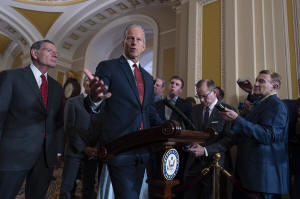Senate struggle over Medicaid cuts threatens progress on Trump's big
bill
[June 26, 2025]
By LISA MASCARO
WASHINGTON (AP) — One key unsettled issue stalling progress on President
Donald Trump's big bill in Congress is particularly daunting: How to cut
billions from health care without harming Americans or the hospitals and
others that provide care?
Republicans are struggling to devise a solution to the health care
problem their package has created. Already, estimates say 10.9 million
more people would be without health coverage under the House-passed
version of the bill. GOP senators have proposed steeper reductions,
which some say go too far.
“The Senate cuts in Medicaid are far deeper than the House cuts, and I
think that’s problematic,” said GOP Sen. Susan Collins of Maine.
Senators have been meeting behind closed doors and with Trump
administration officials as they rush to finish up the big bill ahead of
the president's Fourth of July deadline. Much of the package, with its
tax breaks and bolstered border security spending, is essentially
drafted. But the size and scope of healthcare cuts are among the
toughest remaining issues.
It's reminiscent of the summer during Trump's first term, in 2017, when
Republicans struggled to keep their campaign promise to “repeal and
replace” the Affordable Care Act, or Obamacare, only to see the GOP
splinter over the prospect of Americans losing health coverage. That
legislation collapsed when then-Sen. John McCain famously cast a
thumbs-down vote.
Senate Majority Leader John Thune is determined to avoid that outcome,
sticking to the schedule and pressing ahead with voting expected by the
end of the week.
“This is a good bill and it's going to be great for our country,” Thune
said Wednesday, championing its potential to unleash economic growth and
put money in people's pockets.

The changes to the federal health care programs, particularly Medicaid,
were always expected to become a centerpiece of the GOP package, a way
to offset the costs of providing tax breaks for millions of Americans.
Without action from Congress, taxes would go up next year when current
tax law expires.
The House-passed bill achieved some $1.5 trillion in savings overall, a
large part of it coming from changes to health care. The Medicaid
program has dramatically expanded in the 15 years since Obamacare became
law and now serves some 80 million Americans. Republicans say that's far
too high, and they want to shrink the program back to a smaller size
covering mainly poorer women and children.
House Democratic Leader Hakeem Jeffries said Republicans are “trying to
take away healthcare from tens of millions of Americans.” Democrats are
uniformly opposed to what they call the “big, ugly bill.”
Much of the health care cost savings would come from new 80-hour-a-month
work requirements on those who receive Medicaid benefits, even as most
recipients already work.
But another provision, the so-called provider tax that almost all the
states impose to some degree on hospitals and others that serve Medicaid
patients, is drawing particular concern for potential cuts to rural
hospitals.
Sen. Josh Hawley, R-Mo., said several senators spoke up Wednesday during
a private meeting indicating they were not yet ready to start voting.
“That’ll depend if we land the plane on rural hospitals,” he said.
States impose the taxes as a way to help fund Medicaid, largely by
boosting the reimbursements they receive from the federal government.
Critics decry the system as a type of “laundering” but almost every
state except Alaska uses it to help provide the health care coverage.

[to top of second column]
|

Senate Majority Leader John Thune, R-S.D., center, joined at left by
Sen. John Barrasso, R-Wyo., the GOP whip, speaks to reporters after
Republican senators met with Treasury Secretary Scott Bessent and
worked on President Donald Trump's tax and immigration megabill so
they can have on his desk by July 4, at the Capitol in Washington,
Tuesday, June 24, 2025. (AP Photo/J. Scott Applewhite)

The House-passed bill would freeze the provider taxes at current
levels, while the Senate proposal goes deeper by reducing the tax
that some states are able to impose.
“I know the states are addicted to it,” said Sen. Roger Marshall,
R-Kan. But he added, “Obviously the provider tax needs to go away.”
But a number of GOP senators, and the hospitals and other medical
providers in their states, are raising steep concerns that the
provider tax changes would decimate rural hospitals.
In a plea to lawmakers, the American Hospital Association said the
cuts won’t just affect those who get health coverage through
Medicaid, but would further strain emergency rooms “as they become
the family doctor to millions of newly uninsured people.”
“And worse, some hospitals, especially those in rural communities,
may be forced to close altogether,” said Rick Pollack, president and
CEO of the hospital group.
The Catholic Health Association of the United States noted in its
own letter that Medicaid provides health insurance coverage for one
in five people and nearly half of all children.
“The proposed changes to Medicaid would have devastating
consequences, particularly for those in small towns and rural
communities, where Medicaid is often the primary source of health
care coverage,” said Sister Mary Haddad, the group’s president and
CEO.
Trying to engineer a fix to the problem, senators are considering
creating a rural hospital fund to help offset the lost Medicaid
money.
GOP senators circulated a proposal to pour $15 billion to establish
a new rural hospital fund. But several senators said that's too
high, while others said it's insufficient. Collins has proposed that
the fund be set at $100 billion.
“It won’t be that big, but there will be a fund,” Thune said.
Hawley, who has been among those most outspoken about the health
care cuts, said he's interested in the rural hospital fund but needs
to hear more about how it would work.

He has also raised concerns about a new $35 per service co-pay that
could be charged to those with Medicaid, which is in both the House
and Senate versions of the bill.
“Getting the fund is good. That’s important, a step forward,” Hawley
said. But he asked: “How does the fund actually distribute the
money? Who will get it to hospitals? ... Or is this just going to be
something that exists on paper?”
A new analysis from the White House Council of Economic Advisers
estimates the package would result in up to $2.3 trillion in deficit
reduction over 10 years, a markedly different assessment from other
analyses. In contrast, the nonpartisan Congressional Budget Office’s
dynamic analysis of the House-passed measure estimates an increase
in deficits by $2.8 trillion over the next decade.
__
Associated Press writers Kevin Freking, Mary Clare Jalonick, Joey
Cappelletti and Fatima Hussein contributed to this story.
All contents © copyright 2025 Associated Press. All rights reserved |